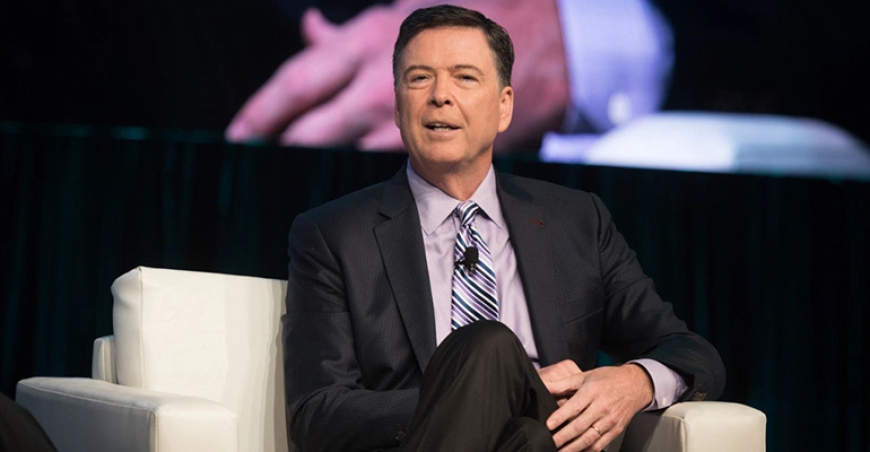James Comey: A Polarizing Figure in Modern American Politics

Introduction
James Comey is one of the most controversial and significant figures in recent American political history. As the former Director of the Federal Bureau of Investigation (FBI), Comey found himself at the intersection of law enforcement, politics, and public trust during one of the most tumultuous periods in U.S. government history. Known for his rigid adherence to institutional integrity and the rule of law, Comey became a household name amid the investigations into Hillary Clinton’s emails and later, the Russian interference in the 2016 presidential election.
This blog post delves into James Comey's early career, tenure at the FBI, pivotal moments, and his lasting impact on politics and public trust.
Early Life and Career Path
From New Jersey to the Justice Department
James Brien Comey Jr. was born on December 14, 1960, in Yonkers, New York, and raised in Allendale, New Jersey. He earned a degree in chemistry and religion from The College of William & Mary before graduating from the University of Chicago Law School.
He began his legal career as a law clerk and quickly moved into prosecution. His early work as an Assistant U.S. Attorney in New York helped him build a reputation for fighting organized crime and corporate fraud.
Table: Key Milestones in Comey's Early Career
| Year | Role | Notable Actions |
|---|---|---|
| 1985 | Assistant U.S. Attorney, Southern District of NY | Prosecuted mafia and white-collar crimes |
| 2002 | U.S. Attorney, Southern District of NY | Oversaw high-profile terrorism and securities cases |
| 2003 | Deputy Attorney General under George W. Bush | Opposed warrantless surveillance without oversight |
Appointment as FBI Director
Nominated by President Obama
In 2013, President Barack Obama appointed James Comey as the 7th Director of the FBI, succeeding Robert Mueller. Despite being a Republican, Comey was seen as a bipartisan choice due to his integrity and experience. His term was set to run for 10 years, but his career took a dramatic turn amid the 2016 presidential campaign.
The Clinton Email Investigation
A Defining Controversy
One of the most critical moments of Comey’s tenure came in July 2016, when he held a rare press conference to announce the FBI's findings regarding Hillary Clinton’s use of a private email server while Secretary of State. Although he recommended no criminal charges, Comey criticized Clinton’s handling of classified information as “extremely careless.”
Just 11 days before the election, Comey reopened the investigation after new emails were discovered on a laptop belonging to Clinton aide Huma Abedin's husband, Anthony Weiner. He later announced that the findings didn’t change the conclusion, but the political damage was done.
List: Effects of the Clinton Email Probe
-
Public Criticism – Clinton and Democrats blamed Comey for her electoral defeat.
-
Partisan Fallout – Republicans praised the investigation, despite no charges.
-
Institutional Strain – Raised concerns about FBI neutrality and timing of disclosures.
The Trump-Russia Investigation and Comey's Dismissal
Comey vs. Trump
Following Donald Trump’s election as President, Comey remained FBI Director. However, his role shifted to investigating Russian interference in the 2016 election and potential ties between the Trump campaign and Russian operatives.
In a move that shocked the political world, President Trump fired James Comey on May 9, 2017. The official reason cited was his handling of the Clinton email case, but media reports and Comey's own later testimony suggest that Trump may have fired him due to frustration with the Russia probe.
Table: Timeline of Key Events Leading to Comey's Firing
| Date | Event | Impact |
|---|---|---|
| Jan 2017 | Trump sworn in as President | Comey continues Russia investigation |
| Feb 2017 | Trump allegedly asks Comey to drop Flynn probe | Comey documents meeting in private memo |
| May 9, 2017 | Comey is fired by Trump | Sparks political firestorm |
| May 17, 2017 | Robert Mueller appointed Special Counsel | Intensifies scrutiny into Trump-Russia ties |
Post-FBI: Memoir, Testimony, and Public Image
"A Higher Loyalty"
In 2018, James Comey published his memoir titled "A Higher Loyalty: Truth, Lies, and Leadership." The book quickly became a bestseller and reignited public debate over his actions during the 2016 campaign and the Russia investigation. Comey presented himself as a principled public servant committed to institutional norms and accountability.
Testimony Before Congress
Comey’s testimonies before the Senate Intelligence Committee were watched by millions. He discussed Trump’s alleged attempts to influence investigations and detailed efforts to protect the FBI from political interference.
Legacy and Public Perception
A Divisive Figure
James Comey remains one of the most divisive figures in American political life. To some, he is a defender of justice and a model of ethical leadership; to others, he is a bureaucrat whose decisions altered the course of history, possibly costing Hillary Clinton the presidency.
List: Arguments For and Against Comey
Supporters Say:
-
He acted independently and spoke truth to power.
-
Protected the integrity of investigations.
-
Preserved rule of law in a time of crisis.
Critics Say:
-
Broke protocol by publicly criticizing Clinton.
-
Interfered in the 2016 election.
-
Was politically naïve about timing and optics.
Media Appearances and Cultural Impact
Comey’s story has been adapted into popular media. In 2020, the Showtime miniseries "The Comey Rule" featured Jeff Daniels portraying Comey, adding a dramatized layer to his public persona. The series portrayed the internal conflict Comey faced while navigating immense political pressure.
Conclusion
James Comey's career embodies the intersection of law, politics, and public accountability in America. His decisions—whether deemed right or wrong—had profound implications for the country and altered the course of modern political history.
From his role in the Clinton email investigation to his abrupt firing during the Russia probe, Comey’s tenure as FBI Director was anything but ordinary. While his name may forever be linked to political controversy, his story also serves as a reflection on the importance of integrity and institutional resilience in democracy.
Love him or loathe him, James Comey's impact on American governance, justice, and public trust cannot be denied.






























